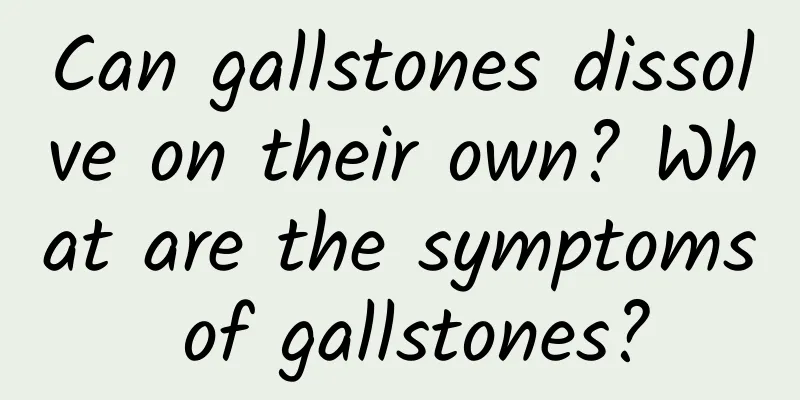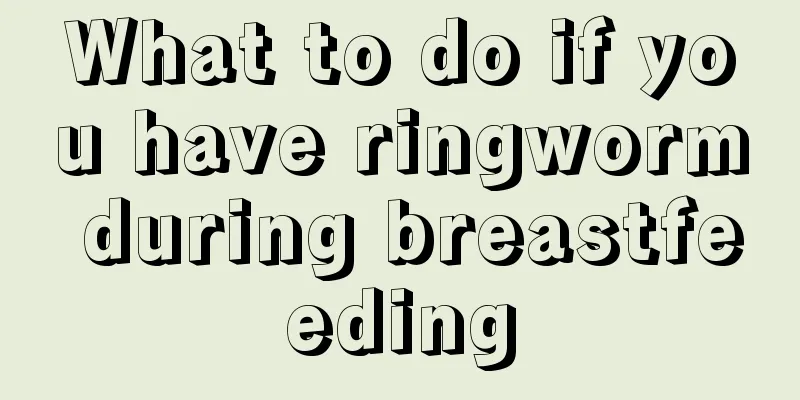Can gallstones dissolve on their own? What are the symptoms of gallstones?

|
Gallstones are stones in the gallbladder and bile duct, and generally do not cause any symptoms. If there are stones in the stomach, of course you have to find a way to "get rid of" them, but will gallstones dissolve on their own if you ignore them? Can gallstones dissolve on their own?It cannot heal on its own, and even taking medication will not dissolve the gallstones. Generally speaking, gallstones will not heal on their own. The so-called self-healing means that the gallstones disappear without any treatment. This is unlikely. If we find that a patient has gallstones, as long as there are no clinical manifestations, such as no nausea, vomiting, no abdominal pain, abdominal distension, and the gallstones are only found during a physical examination, then generally surgery can be temporarily avoided and observation can be performed. However, about 30% of people will have symptoms in the future and will eventually need surgery. If gallstones also have some symptoms, then surgery should be considered, because the effect of drugs is not good. Laparoscopic minimally invasive surgery is the first choice for surgery, which has less damage and small incisions, but the cost is relatively high, and some complex gallstones may still require open surgery. Some gallstones may have no symptoms, but they still need treatment. For example, if the number and diameter of the gallstones are relatively large, or if there are gallbladder polyps at the same time, then surgical removal of the gallbladder is required. Therefore, gallstones will not heal on their own, nor can they be cured by medication. What are the symptoms of gallstones?No obvious symptoms at the beginningGallstones usually have no obvious symptoms in the early stages of the disease and are usually discovered during routine physical examinations. Some people may also experience mild discomfort, which is sometimes mistaken for a stomach disease. Biliary colicWhen the patient is overfed, eats too much greasy food, changes his body position while sleeping, the gallbladder contracts or stones move, the vagus nerve is excited, the gallbladder is blocked from emptying in the abdomen and neck, and the internal pressure increases, the colic is caused by strong contraction. The pain is located in the upper abdomen and is paroxysmal or continuous, radiating to the right shoulder blade and back, and causing nausea and vomiting. After the first episode of biliary colic, approximately 70% of people experience a recurrence within a year. Dull pain in the upper abdomenMany patients will experience upper abdominal or right upper abdominal pain, or symptoms such as bloating, belching, and hiccups only when they eat too much, eat high-fat foods, work under stress, or do not get enough rest. Acute cholecystitisIf the gallstones are embedded in the joints for a long time without relief, the gallbladder will continue to enlarge, and serious infection may occur, leading to acute cholecystitis. If treatment is not timely, a small number of patients may develop acute suppurative cholecystitis, and there is even a risk of gallbladder perforation. Asymptomatic gallstonesSome single or multiple gallstones exist freely in the gallbladder, are not easily impacted, and rarely show symptoms. They are called asymptomatic gallstones. How should patients with gallstones pay attention to their diet1. In principle, you should focus on a high-protein, low-fat diet and choose high-quality, low-cholesterol foods such as fish, lean meat, milk, and soy products. It is best not to eat high-cholesterol foods, such as hairy crabs. 2. Reduce the intake of animal fat and increase the intake of vegetable oils, such as corn oil, sunflower oil, peanut oil, soybean oil, etc. 3. It is best to drink more than 2000 ml (about 4 to 5 bottles of mineral water) every day. Drinking water can dilute the blood, thereby reducing the concentration of bile secreted by the liver, so it is not easy to form stones. It is best to drink boiled water and drink less sugary drinks. 4. Eat more fresh fruits and vegetables, such as apples, oranges, strawberries, lemons, asparagus, cabbage, broccoli, carrots, etc. Other foods such as millet, black fungus, carrots, water chestnuts, yam, tofu, white radish, vegetables, etc. can also be used. |
>>: How dry is the potted plant? How to water it? How to plant cucumbers in potted plants?
Recommend
AIDS vaginal
The HIV virus enters the human body through the v...
Can breast nodules become diseased?
Breast diseases have always been feared by women....
Can women soak their feet during menstruation?
Menstruation is a special period for women. Ensur...
Brown jelly-like vaginal discharge during ovulation
The secretions during ovulation can reflect our c...
40-year-old woman with leg cramps
There are many different causes of leg cramps. Ca...
What is the painless childbirth experience like?
Painless childbirth is the choice of many pregnan...
A smart woman's way to end an extramarital affair
No matter how smart a woman is, she will make mis...
What to do if you have breastfeeding enteritis
Women who are breastfeeding also need to strictly...
Will my belly get bigger at 9 weeks of pregnancy?
To determine whether a woman is pregnant, others ...
How to remove the IUD? The correct way to remove the ring
There are some things to pay attention to when in...
Low progesterone, gestational sac cannot be seen on ultrasound
During the examination, if the progesterone level...
How do blood clots form? These 7 types of people are more likely to be "targeted" by blood clots
In our body, blood clots are like "roadblock...
How much radiation does the human body receive when eating a banana, taking a flight, or having a chest X-ray?
丨Author: Hao Zhixin, Peking Union Medical College ...
What do contractions feel like?
Pregnant women will experience uterine contractio...
What is the reason for vaginal discharge that looks like tofu dregs and is accompanied by vulvar itching?
Women's leucorrhea often has some abnormal co...









